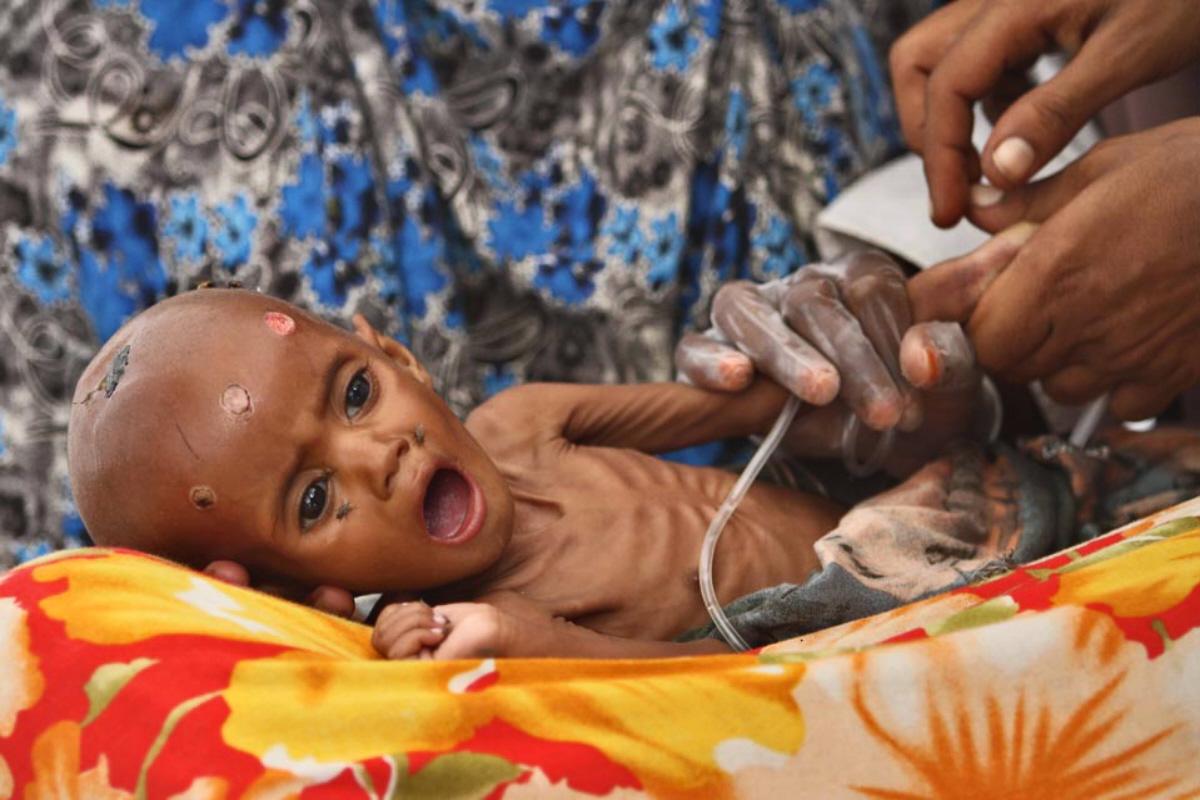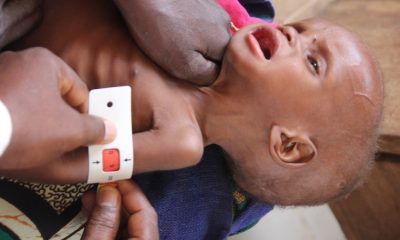General
Hunger Eases First Time Since Boko Haram Crisis

By Modupe Gbadeyanka
For the first time since the onset of the Boko Haram crisis, hunger has considerably declined in north eastern Nigeria. In the three states ravaged by the violence, the number of people facing acute hunger has halved since June-August – from 5.2 million to 2.6 million people – according to the latest Cadre Harmonisé food security analysis.
This is a major step forward thanks to an overall improved security situation, and the scaling-up of humanitarian and longer-term livelihoods assistance by the government and its partners.
The report warns, however, that without sustained and timely assistance, all good work could quickly be undone; more than 3.5 million people could battle again with acute hunger, including a risk of famine, by next August.
FAO provided cowpea, maize, millet, sorghum, vegetable seeds and fertilisers to 1 million people – internally displaced populations (IDPs), returned refugees and host communities – to help them get through the last rainy season (June-September) when food stocks are low.
Now, as the harvest season is winding down and communities transition into the dry season and a new planting phase, FAO is aiming to further boost local production through distributions of vegetable seeds, farming kits, fertilisers and irrigation equipment to some 780,000 people across the three states.
In Yobe, one of the three states affected by violence, the villages are still a bustling field of yellow as farmers cut the last millet and sorghum and pile them in neat bundles. The smell of freshly cut crops lingers in the air.
Everyone takes part in the harvest – the children cut the head of the millet, the women thresh it, the men bundled it and carry it home. For many, this is the first time they have enough food to eat.
“This will be enough food for the family, and with the money from my knitting business, I will plan for my children’s education,” said 37-year-old Aisha Ibrahim who was forced to flee her village three years ago and has been displaced ever since.
“Families in my village help about five to six displaced people each. They depend on our assistance. Good harvest brings joy to all of us. It reduces the pressure and makes us stronger,” said Malam Mohammed, a local farmer from Ngalda village who supports IDPs.
By supporting host communities to plant during the rainy season, FAO has also brought relief to displaced, landless populations who could work in the fields and earn an income.
“The local communities have helped me; I could work on their farms and got paid,” said 40-year-old Hajanuwe Sulieman, a widowed mother of eight children who has been displaced by violence three years ago and is now taking refuge in an informal settlement of Mainok. This is a considerable support for Hajanuwe who, at times, has had to resort to begging to make ends meet.
Across north eastern Nigeria, violence aside, farmers have been through a lot these past few months; some have had to deal with a dry spell, others with flooding. Others still with pest infections that ate their crops.
But now the fields are dry and farmers like Malam and Hajanuwe are getting ready to plant again.
Sustained support – from rainy to dry season – builds vulnerable communities’ resilience, strengthens their capacity to grow both staple and cash crops, and reduces the need for food assistance.
General
Nigerian Bottling Company Bridges Education, Employability Gap

By Modupe Gbadeyanka
The Nigerian Bottling Company (NBC) has reaffirmed its determination to bridge the gap between education and employability in the country by sustaining its flagship Youth Empowered (YE) programme.
This initiative provides hands-on learning, real-world insights, and access to career-shaping opportunities to young Nigerians.
The 2026 edition of the scheme commenced on February 2 at the University of Lagos (UNILAG), with participants mainly young people between the ages of 16 and 35.
A statement from the organisation said this year’s rollout will expand to more tertiary institutions, including the Federal University of Technology, Akure (FUTA). This follows a successful 2025 tour that reached seven cities across the country, including Makurdi, Jos, Benin, Kaduna, Asaba, Akure, and Port Harcourt.
Participants in the 2026 programme will receive training across key modules designed to support personal, professional, and business growth, including Business Life Skills, Adaptability and Resilience, Financial Literacy, Customer Service and Communication, Sales and Negotiation Skills, and Workplace Ethics.
The sessions will also feature breakout workshops on Business Planning, Project Management, and Time Management, alongside the Director’s Grant Pitch Competition, where participants can pitch their ideas for a chance to win business funding.
In addition to skills development, NBC’s People and Culture team will be present throughout the programme to identify outstanding talent for future opportunities within the organisation, further strengthening the connection between learning, employment, and long-term career growth.
One of the participants at the UNILAG training, Waliat Adedogun, who received a cash grant through the Director’s Grant Pitch Competition to support her small business, said: “Youth Empowered gave me more than training; it gave me clarity and confidence. Winning the grant means I can finally take my business idea from a dream into something real. I now feel prepared to build, grow, and create opportunities not just for myself, but for others too.”
Since its launch in 2017, the scheme has impacted more than 70,000 young Nigerians, equipping participants with practical skills, confidence, and exposure needed to succeed in today’s dynamic workplace and entrepreneurial landscape.
This year’s programme is being delivered in collaboration with Fate Foundation as the implementing partner, with funding support from The Coca-Cola HBC Foundation.
Last year, 10 beneficiaries were selected for six-month paid internships across NBC locations in Lagos, Ibadan, Asejire, and Challawa, gaining direct industry exposure.
Additionally, three outstanding participants received sponsorship for an all-expenses-paid intensive culinary training programme and were awarded N1 million each to support the launch of their businesses.
General
INEC Fixes February 20 for 2027 Presidential, NASS Elections

By Modupe Gbadeyanka
The 2027 presidential and National Assembly elections will take place on Saturday, February 20, the Independent National Electoral Commission (INEC) has revealed.
In a notice for the 2027 general polls issued on Friday, the electoral umpire also disclosed that the governorship and state assembly elections for next year would be on Saturday, March 6.
Speaking at a news briefing in Abuja today, the chairman of INEC, Mr Joash Amupitan, expressed the readiness of the commission to conduct the polls next year, which is 12 months away.
The timetable issued by the organisation for the polls comes when the federal parliament has yet to transmit the amended electoral bill to President Bola Tinubu for assent.
This week, the Senate passed the electoral bill, reducing the notice of elections from 360 days to 180 days, while the transmission of results was mandated with a proviso.
Recall that on February 4, INEC said it was ready to go ahead with preparations for the elections despite the delay in the passage of the amended electoral law of 2022.
General
NGIC Pipeline Network to Experience 4-Day Gas Supply Shortage

By Modupe Gbadeyanka
The pipeline network of the NNPC Gas Infrastructure Company Limited (NGIC) will witness a temporary reduction in gas supply for four days.
This information was revealed by the Chief Corporate Communications Officer of the Nigerian National Petroleum Company (NNPC) Limited, Mr Andy Odeh, in a statement on Thursday night.
A key supplier of gas into the NGIC pipeline network is Seplat Energy Plc, a joint venture partner of the state-owned oil agency.
It was disclosed that the facility would undergo routine maintenance from Thursday. February 12 to Sunday, February 15, 2026.
The NNPC stated that, “This planned activity forms part of standard industry safety and asset integrity protocols designed to ensure the continued reliability, efficiency, and safe operation of critical gas infrastructure.”
“Periodic maintenance of this nature is essential to sustain optimal system performance, strengthen operational resilience, and minimise the risk of unplanned outages,” it added.
“During the four-day maintenance period, there will be a temporary reduction in gas supply into the NGIC pipeline network. As a result, some power generation companies reliant on this supply may experience reduced gas availability, which could modestly impact electricity generation levels within the timeframe.
“NNPC Ltd and Seplat Energy are working closely to ensure that the maintenance is executed safely and completed as scheduled. In parallel, NNPC Gas Marketing Limited (NGML) is engaging alternative gas suppliers to mitigate anticipated supply gaps and maintain stability across the network,” the statement further said.
“Upon completion of the maintenance exercise, full gas supply into the NGIC system is expected to resume promptly, enabling affected power generation companies to return to normal operations,” it concluded.
-

 Feature/OPED6 years ago
Feature/OPED6 years agoDavos was Different this year
-
Travel/Tourism10 years ago
Lagos Seals Western Lodge Hotel In Ikorodu
-

 Showbiz3 years ago
Showbiz3 years agoEstranged Lover Releases Videos of Empress Njamah Bathing
-

 Banking8 years ago
Banking8 years agoSort Codes of GTBank Branches in Nigeria
-

 Economy3 years ago
Economy3 years agoSubsidy Removal: CNG at N130 Per Litre Cheaper Than Petrol—IPMAN
-

 Banking3 years ago
Banking3 years agoSort Codes of UBA Branches in Nigeria
-

 Banking3 years ago
Banking3 years agoFirst Bank Announces Planned Downtime
-

 Sports3 years ago
Sports3 years agoHighest Paid Nigerian Footballer – How Much Do Nigerian Footballers Earn















